It’s official: hip-hop has now become America’s most popular music genre. Rappers seem to have it better than ever — but have you ever wondered exactly how they make their money?
Or are you an aspiring hip-hop artist yourself and are curious to know what the realities of the job are?
Rappers make money by selling albums, performing live, and going on tours. Additionally, they receive royalties whenever their music is sold, distributed, broadcast, or monetized by third parties.
Rappers can also make money by sponsoring products or selling their own branded merchandise.
In addition to these traditional revenue streams, hip-hop artists nowadays can get paid for having their tracks played on online streaming platforms and YouTube.
However, these more recent sources of income are not unproblematic and have caused some friction in the music industry. If you want to learn why, as well as how you can start making money as a beginner rapper, keep reading.
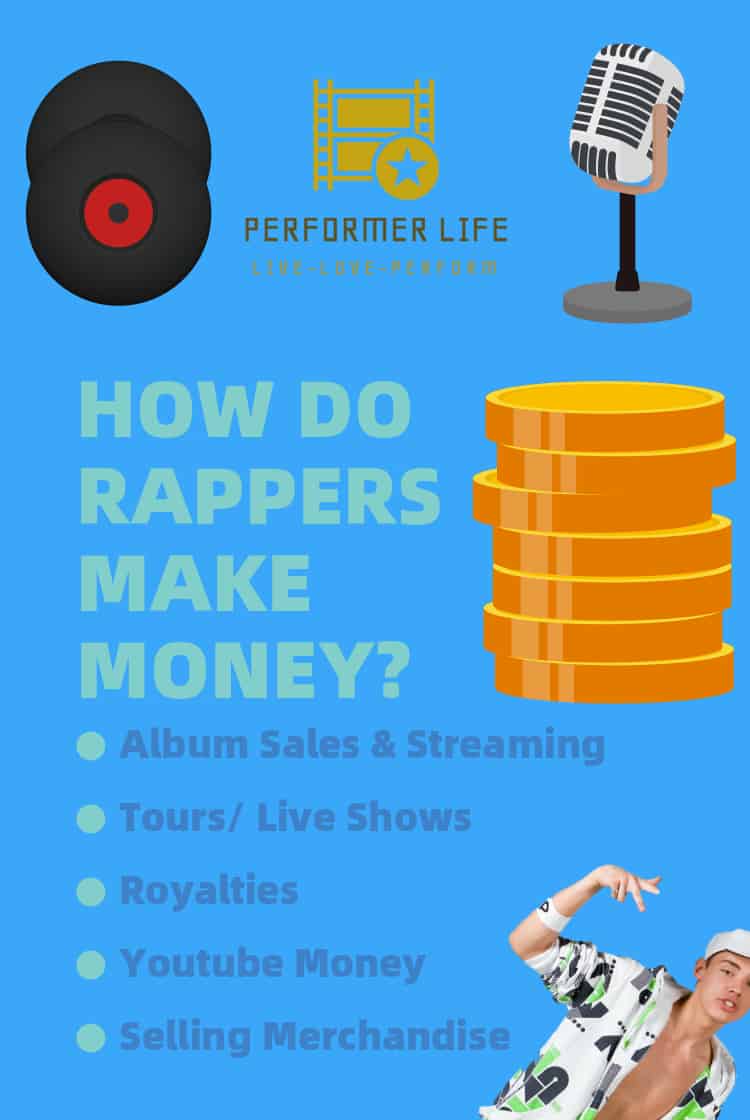
Table of Contents
Album Sales
This one may come as a surprise, especially in light of the dramatic decrease in the sales of both physical CDs and digital albums in the past decade. Still, album sales remain an important source of income, at least for the top-performing rappers.
How do we know that?
Billboard magazine has been tracking the best-selling albums in the United States since 1956 in its annual Billboard 200 chart. However, things got a bit muddy in 2015 when the magazine updated its ranking methodology to cover the sales not just of albums but also album-equivalent units.
These include digital track sales as well as on-demand streaming on platforms such as Apple Music, Google Play, Spotify, and YouTube.
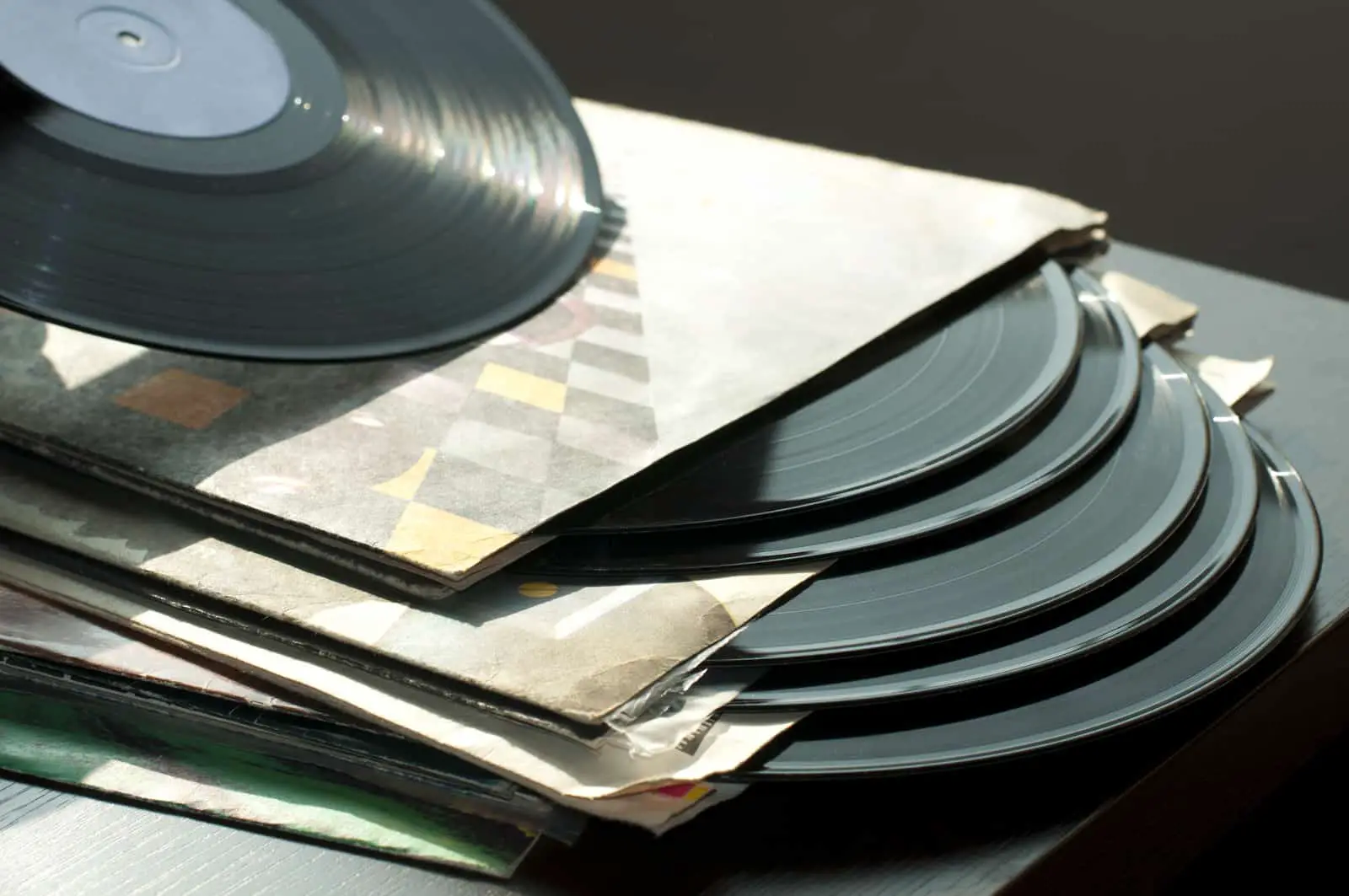
Billboard continues to maintain a chart called Top Album Sales that ranks pure album sales only. While Billboard does not publicize the exact number of albums sold, Eminem’s Kamikaze and Travis Scott’s ASTROWORLD were among the top ten best-selling albums in 2018.
If we consider the pre-2015 period, which was not that long ago, we will see that the best-selling rap albums averaged 304,400 units in 2013.
That same year, Good Kid Maad City by Kendrick Lamar topped the charts with a staggering 746,000 units sold. If the album retailed at an average price of $15 per piece, that equals $11,190,000.
While the bulk of it goes to the retailer, manufacturer, label, and distributor, as well as toward studio and production costs, rappers retain a percentage of the money too.
Of course, such jaw-dropping figures are not within the reach of lesser-known and amateur hip-hop artists.
However, album sales are a revenue stream that you should definitely consider tapping into once you establish a more substantial and dedicated following.
Tours and Live Performances
In the age of on-demand streaming services, consumers have never had easier and cheaper access to all their favorite artists.
One would expect that this would have had a negative impact on live performances, just like it has on album sales. However, this could not be further from the truth.
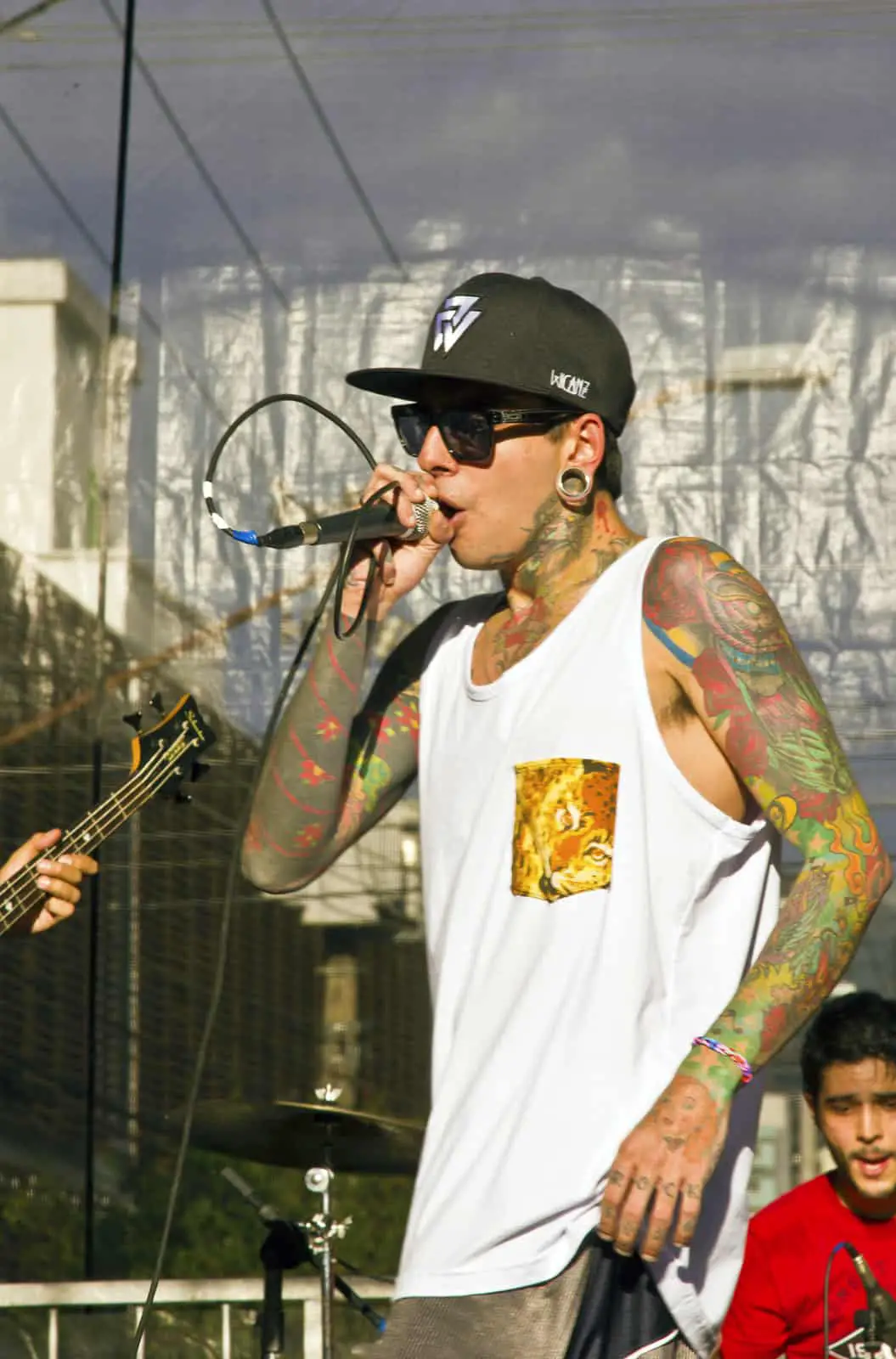
In reality, live performances are seeing record-breaking turnouts. Tours are getting larger by the year, and music festivals are attracting more people than ever before.
According to Pollstar, an online trade publication for the global concert industry, the 2018 mid-year gross for the live music market hit an all-time high of $2.21 billion.
That amounted to a 12 percent increase compared to the previous year. The average ticket price was higher than ever, too, reaching $96.31.
Paradoxically, industry experts believe that this unprecedented growth in the industry is due to the ubiquity of digital music. The fact that listeners are consuming more music than ever before is driving more demand.
In addition, the more time people spend behind their phone or laptop screens, the more they crave real-life intimate contact with their favorite performers and with other fans.
The result? Live events are now widely considered as the most lucrative way for artists to make money from their music.
Copyright Royalties
Rappers, just like other artists and creative industry professionals, receive payments called royalties because they own the copyrights for their music and any related intellectual property.
Generally speaking, rappers receive royalties whenever their songs or albums are sold, distributed, reproduced in other media, or monetized.
Composition vs. Sound Recording Copyrights
When it comes to songs, however, things get a little more complicated. There is not one but two separate copyrights to each song.
On the one hand, you have the composition copyrights, which are owned by the people who wrote the lyrics and the melody of the song. On the other hand, you have the sound recording copyrights.
These protect the audio recording of the song and are owned by the recording artists and the record labels.
The trick here is that the holders of a song’s composition and sound recording copyrights may or may not be the same people or entities. This sometimes gives rise to certain complications, as we shall see shortly.
Copyright Licenses
Copyright holders generate royalties by granting sound recording licenses to third parties who want to monetize their music. There are many different types of sound recording licenses, including:
Reproduction Rights
Reproduction rights allow the sale and distribution of physical CDs or digital files. So, whenever you buy a CD or a song from a digital store such as iTunes or Google Play, the copyright owners receive a percentage of that money.
They also get paid whenever their music is played on on-demand streaming platforms, on the premises of businesses and retailers, and for any other commercial purpose.
The payout rates depend on a lot of factors, including the terms negotiated by the label and the distributor, as well as any other parties involved.
Sync Rights
Sync rights allow the use of a song or music piece in films, on television, in commercials, and other media formats. This process is also known as synchronization, and it can be quite lucrative.
Copyright owners get paid a fee upfront and also receive royalties once the movie or TV show in question is distributed and broadcast.
Sync licenses can be a great way for lesser-known rappers and hip-hop artists to get noticed and land great deals. Typically, filmmakers and TV directors pick the music they personally like or that fits their creative vision rather than chart-topping hits.
Performance Rights
Performance rights allow a song to play on various media such as AF/FM radio, Internet radio, satellite radio, and streaming services.
The owners of the copyrights receive payments in exchange for allowing their songs to play on the radio.
Here Is Where Things Get Tricky
Reproduction and sync rights generate royalties for the holders of both the composition and sound recording rights. If they are the same people, great — a lucky someone will get the double cash flow.
However, if they are not the same people, which is the more common case, the revenue stream splits in two. The songwriters, composers, and publishers will get the royalties for the composition copyright, and the artists and record labels and will get the royalties from the sound recording copyright.
This creates a problem when it comes to playing music on broadcast radio, i.e., AM/FM, on the one hand, and Internet radio, such as SiriusXM, Pandora, webcasters, and satellite radio, on the other.
AM/FM broadcasters are only required to pay the owners of the composition rights. That means only people who get paid are the songwriters.
In contrast, the holders of the sound recording copyrights, which are often the performing artists themselves, are left with nothing.
YouTube Monetization and Brand Sponsorships
We live in the golden age of YouTube: everyone and their dog seem to be YouTubers these days. Hip-hop artists, too, along with pretty much everyone in the music industry, are now setting up and running monetized YouTube channels.
And things seem to be going quite well for them: the South Korean singer, rapper, and songwriter Psy reportedly made over $2 million from the 2 billion views of his global hit Gangnam Style.
Clearly, YouTube monetization can generate excellent side income. What’s more, it is available to anyone with internet access.
So, if you are an amateur, beginner, or lesser-known rapper, you should definitely consider YouTube as a potential revenue stream and a great way to reach a wider audience.
The low barrier to entry and the largely merit-based system make YouTube a real springboard to success.
But how does YouTube monetization work? It’s simple: YouTubers get paid for the ads that are streamed on their videos. There are three types of ads that can be embedded on a video:
Pre-Roll Video Ads
These are placed right before the start of the video and typically run for about 30 seconds. Channel owners get paid per click, which means that brands will pay for the number of times people clicked on the ad, rather than the sheer number of views.
In-Stream Ads
In-stream ads also show up before the video starts, but viewers have the option to skip them after the first five seconds. For this type of ad, advertisers pay per view.
Bumper Ads
These are short, non-skippable ads that are usually only six seconds long. They also run before the video, and you will be paid per view.
How Much Does YouTube Pay?
YouTube ad payout rates vary greatly depending on the state of the market, the country you are in, the size of your channel, and the advertisers themselves.
In addition, different types of ads pay differently: skippable in-stream ads tend to be the most lucrative, followed by pre-roll ads.
Typically, artists make around $6 per 1,000 impressions. Note that the number of impressions does not equal the view count: on average, only about 30 to 40 percent of the views qualify as impressions.
So, if you get 200,000 views on a video, that will give you about 80,000 impressions and around $264 in payouts. That said, however, YouTube’s advertising policy changes all the time, so make sure to do your research.
Brand Sponsorships
Sponsorships are another great way to make money on YouTube. Brands will often reach out to popular creators asking them to promote their products or services.
You will get paid for product placement or endorsing the brand on your channel. Alternatively, you can also contact brands yourself, which might be a good idea if you are still looking to establish your name as a rapper but have a decent online following.
On-Demand Streaming Services
Rappers can also make money by making their music available on online streaming services. Unfortunately, however, it can be difficult for artists to get decent earnings.
As of June 2019, Spotify reportedly paid artists $0.0032 per stream on average. Apple Music and Google Play stood a bit higher at $0.0056 and $0.0055, respectively, and Deezer was slightly lower at $0.00436.
The way the system is set up means that the most popular artists can make millions in payouts while the small ones are left with rather meager sums — a winner-takes-all-situation if ever there was one.
Another reason for the modest profits to be made on streaming platforms is the large number of middlemen in the industry.
And then there is the royalty black box: a vast amount of unpaid royalties that experts estimate is around $2.5 billion.
Due to various obscure technical reasons such as server miscommunication and faulty metadata, the number of streams is severely under-reported.
The good news is that experts believe that the industry is eventually going to regulate itself via legislative changes, better-negotiated contractual terms, and technological innovation.
While no one can predict when that will happen, if you are a little-known hip-hop artist, it is still worth your while to make your music available for streaming.
Not only will this generate some cash at least, but you will also get exposure to a potentially wider audience.
Advertising
So far, we have only focused on how rappers can make money through their songs. However, hip-hop artists can also monetize their music and fame indirectly via advertising.
Traditionally, rock stars and even some pop singers have been reluctant to advertise or endorse brands. The presumption was that this would make them come across as sellouts.
Things could not be more different in hip-hop, where the vast majority of rappers have been more than willing to accept brand partnerships.
One explanation for this might be the money-oriented, hustling mindset that is such a substantial part of hip-hop culture. The drive to succeed and make the big bucks just comes with the territory.
Brands have been quick to capitalize on the opportunity. What’s more, they have been rather creative in coming up with ingenious and industry-specific forms of marketing.
For the most part, traditional direct advertising has been eschewed in exchange for more subtle techniques such as name-dropping brand names in rap lyrics.
To take a well-known example, the word Gucci appears over 6,000 times in English-language song lyrics. Some hip-hop artists have gone so far as to embed the brand’s name in song titles (think Soulja Boy’s Gucci Bandana). Others, like Gucci Mane, have even made it a part of their artistic pseudonyms.
Of course, not everyone can land a sweet Gucci deal. Still, there are countless other smaller and mid-sized brands that are keen on partnering with rappers, which range from traditional industries like fashion, travel, and food and beverage to entirely new niches such as e-sports.
What’s more, it’s not just the top rappers who get all the deals: there is definitely a market for up-and-coming performers too. You just have to put yourself out there and be persistent.
Selling Merchandise
Once you make a name for yourself as a rapper, you can branch out into selling your branded merchandise. Many successful hip-hop artists have their own perfume and clothing lines, but there are many other potentially lucrative types of merch to consider.
You could also sell digital products such as limited song and album releases, email subscriptions, or other premium online content.
Best of all, in this day and age, you do not need to be a chart-topping performer to sell merch: if you build a relatively popular YouTube channel, you can use it to promote your products to your followers.
Crowdfunding
Crowdfunding campaigns on popular platforms such as Kickstarter or GoFundMe can be a great way for independent rappers to get their foot in the door.
If you have a small but dedicated fanbase and an original creative project in mind, crowdfunding can help you raise the money you need to finance your idea.
And it works, too: in 2017, Chilli and T-Boz managed to raise over $400,000 to fund their final album. De La Soul is another wildly successful example: in 2015, their Kickstarter campaign raised more than $600,000 for their upcoming album.
What’s more, they raised $180,974 within the first 24 hours of launching the campaign.
Furthermore, while it might take a while to collect the funds, crowdfunding comes with no strings attached. You have pretty much unlimited creative license to follow your vision.
This is something you may not get when working with a producer or a music label; they tend to have their own ideas of how your music should sound.
How to Make Money as a Beginner or as an Independent Rapper
Whether you are just starting out in the industry or are an independent artist who could use some advice on how to make it on their own, the tips below should come in handy.
It can be incredibly difficult to get noticed in today’s overly saturated market, let alone make a decent living just from music. So, the chances are you need all the help you can get.
Perfect Your Craft
No matter how hard you try, you simply cannot be a successful rapper if you don’t write great music.
So, make it a point to perfect your craft to a tee. Listen profusely to all sorts of music — not just hip-hop — to learn from the great masters and get inspired. Carefully analyze the best lyrics in the history of rap in order to find out what made those songs so popular.
Reach out and talk to other performers, artists, producers, and other people from the industry to get their perspective on things.
But most importantly, write, compose, and perform as often as you possibly can. The more effort you put into your songs, the better they will come out — and the more listeners they will attract.
And if you hit a creative block, don’t worry; it shall pass. What matters is that you never stop creating and showing up for your music.
Get on Social Media
In this day and age, you simply must be on social media if you want to gain even a modicum of popularity.
Cultivating a solid social media presence is the secret to building a wider audience, connecting with your fanbase, and promoting your art.
However, don’t overdo it by setting up an account on every single platform out there, as this will take tons of work. Your music should be what you spend most of your time and attention on.
So, either hire a social media manager to monitor and update daily all your profiles on Facebook, Instagram, Twitter, Snapchat, and TikTok or just pick two to three platforms.
The key here is to be consistent with your updates and to generate quality content for your followers.
Build a Public Persona
If you want to be a commercial hip-hop artist, you need to build a recognizable brand. That includes having a unique personal image that your audience can aspire to or relate to.
And your persona does not need to be fake either: you can simply highlight one or two of your most distinctive personality traits.
You can be funny, tough, approachable, or smart. You can be a hustler, a lover, or a die-hard comedian at heart; the only limit is your creativity. What matters here is that you remain authentic and true to yourself.
People will quickly pick up on most attempts at faking it, and disingenuous “stars” have a short sell-by date.
Use Your Other Talents
In addition to rap, what other talents have you got? Do all your friends tell you that you are super funny? Have you got a knack for writing poetry and not just hip-hop lyrics?
Are you a gifted photographer, a self-taught chef, or a fitness aficionado? Do you have a great sense of style and a keen eye for fashion?
It’s vital that you find out what your other talents are and use them to your advantage — and to promote your rap music.
If you are a great cook, for example, you can share your very own tips, recipes, and cooking videos on your social platforms. If you have a great sense of humor, record and post skits or short stand-up comedy pieces.
As long as you produce high-quality content, it will help you attract more followers and introduce them to your music. Initially, many of them might come for your workout routine, but most will stay for the rap.
Do NOT Sell Your Music
Wait — what? Isn’t selling music the whole point of making money as a rapper? Yes, it is. But in order to get there, you might need to make a few compromises when first starting out.
Your music is your main product, but it is also the best tool at your disposal to build a fanbase and reach a broader audience. If you are an up-and-coming rapper, the last thing you want to do is make the handful of people who have discovered your songs — and also happen to like them — pay for the privilege.
Instead, make your music free for all and focus on branching out and amassing more listeners. Once you have a solid following, you can consider charging people.
However, make sure to still offer plenty of free content. That way, you will continue to attract more and more people as time goes on.
Don’t worry; this won’t cause you to lose money. Your die-hard fans will be happy to support you financially by purchasing premium content, attending live performances, buying merch, or contributing to crowdfunding campaigns.
Final Thoughts
Hip-hop may have now become America’s most popular music genre, but it is still hard to make a living as a rapper, especially if you are trying to get your foot in the door of the industry.
You need raw talent, hard work, business acumen, and a willingness to capitalize on all possible streams of revenue out there. But most importantly, you should never give up on yourself and your art.
So, to recap, here are how rappers make money these days:
- Album sales
- Live performances and tours
- Copyright royalties
- YouTube monetization
- On-demand streaming services
- Advertising
- Selling their own branded merchandise
Sources
- Amuse: How to Make Money on YouTube: A Guide for Music Artists
- Artist Shortcut: How to Make Money as an Upcoming Hip-Hop Artist
- BBC: Is This the End of Owning Music?
- Billboard: Billboard 200
- Billboard: Top Album Sales
- Business Insider: For the First Time in History, Hip-Hop Has Surpassed Rock to Become the Most Popular Music Genre, According to Nielsen
- Digital Music News: Welcome to the ‘Royalty Black Box,’ the Music Industry’s $2.5 Billion Underground Economy
- Forbes: At 2 Billion Views, ‘Gangnam Style’ Has Made Psy a Very Rich Man
- Kickstarter: TLC Is BACK to Make OUR FINAL ALBUM with YOU!
- Lyrics.com: Search Results for ‘Gucci’
- Music Industry How-To: How Do Rappers Make Money? The Truth Revealed!
- Pollstar: 2018 Mid-Year Special Features; Top Tours, Ticket Sales, Business Analysis
- Rolling Stone: How Musicians Make Money — Or Don’t at All — in 2018
- Rolling Stone: Rap’s Ascent Is Bringing a Whole New Money Stream to Music
- Rolling Stone: Why Your Favorite Concerts Are Bigger – and More Expensive – Than Ever
- Royalty Exchange: Guide to Sync Royalties
- Sound Charts: What Music Streaming Services Pay Per Stream (And Why It Actually Doesn’t Matter)
- Stop the Breaks: Crowdfunding Your Music for Independent Hip-Hop Artists
- Wikipedia: Album-Equivalent Unit
- Wikipedia: AM Broadcasting
- XXLMag: 7 Times Rappers Have Used Crowdfunding
- XXLMag: De La Soul Raises $600K in Kickstarter Album Fund
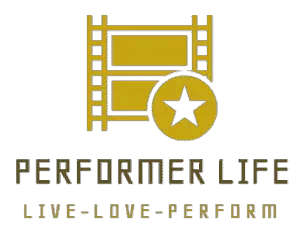
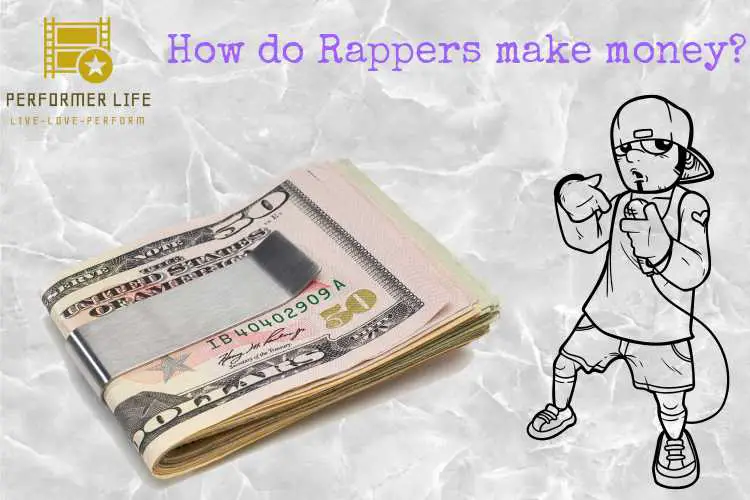

![HERE’S What Happened to the Soul Singer Al Green [2023 Update]](https://performerlife.com/wp-content/uploads/2023/04/what-happened-to-al-green-211x150.jpg)
